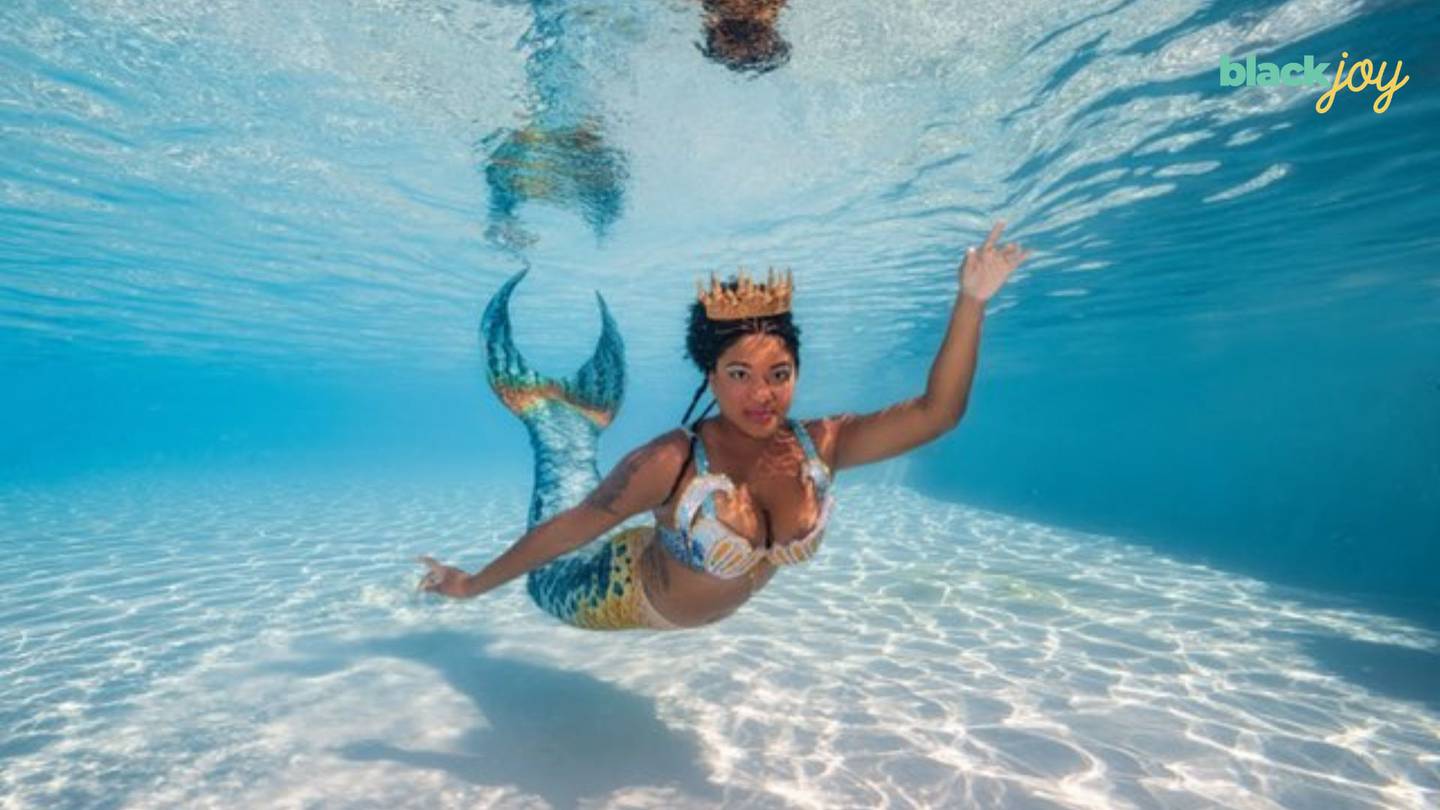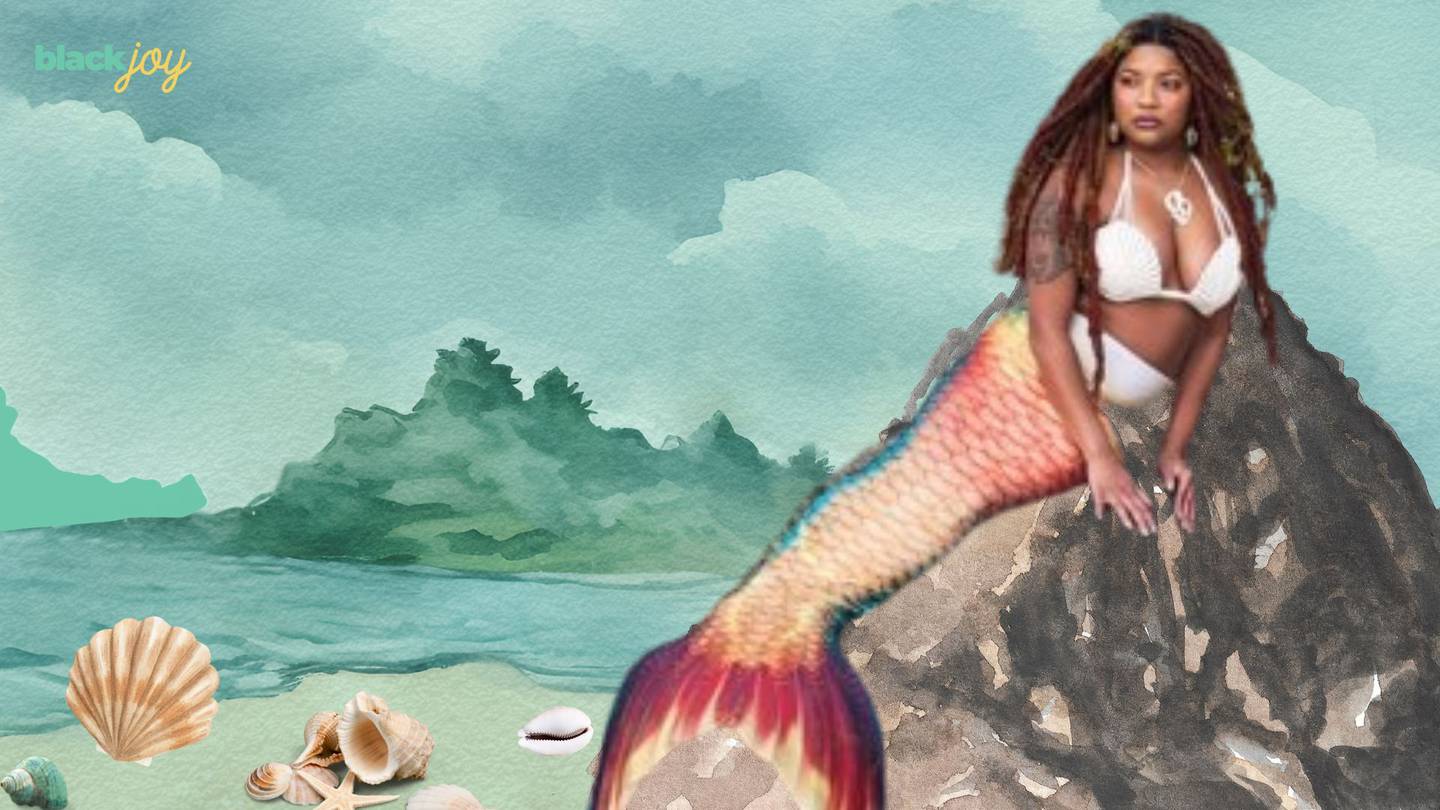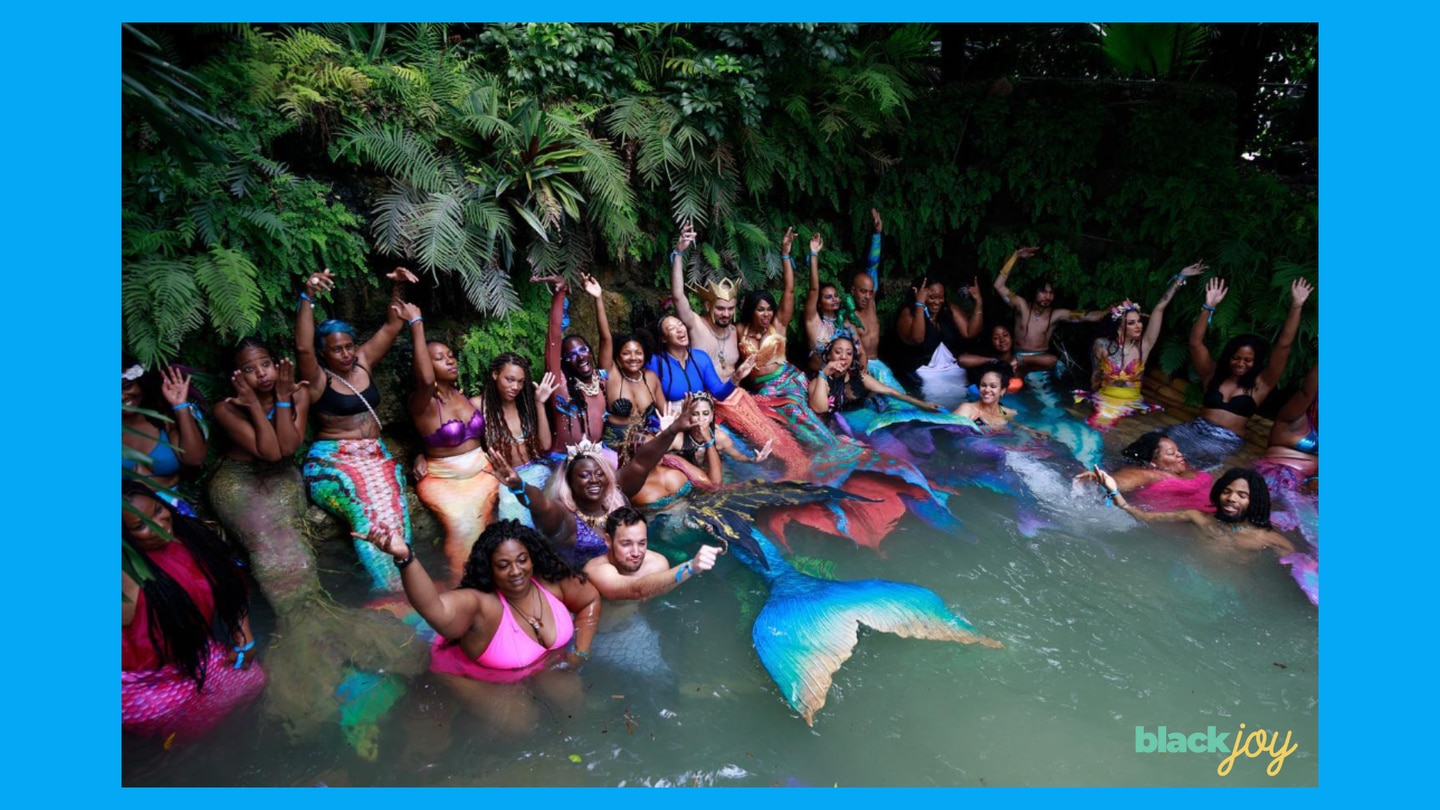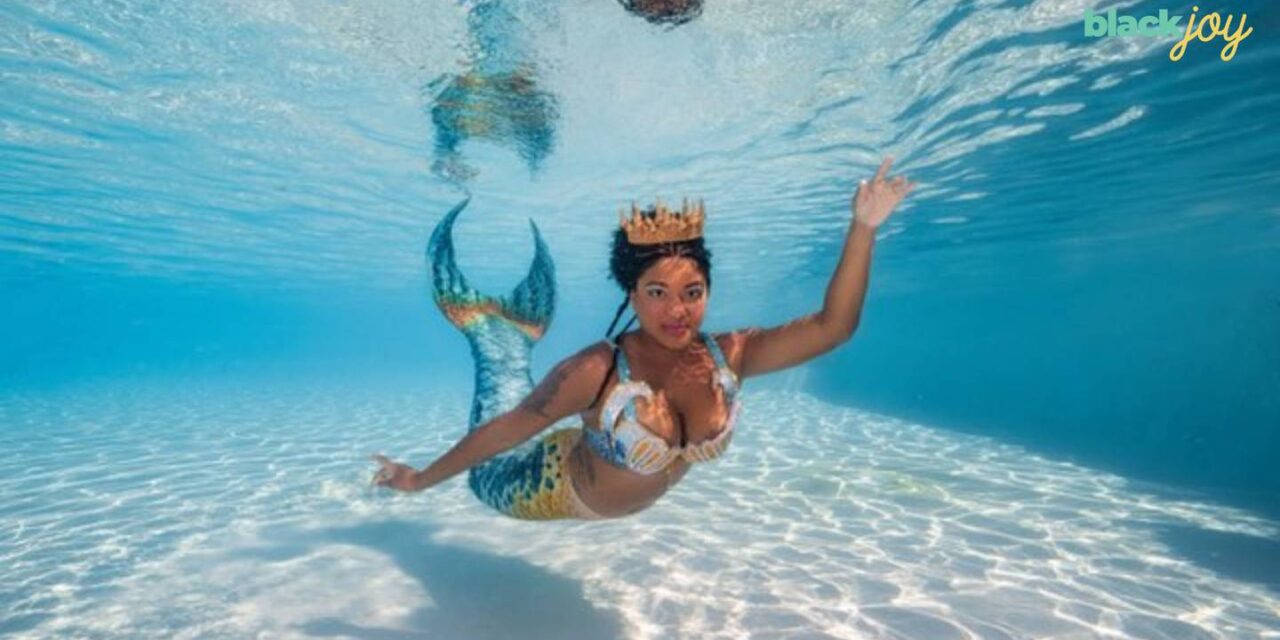
In the same state where a Republican governor wants to whitewash history, a Black mermaid is reclaiming the water as an ancestral healing ground for African Americans.
That’s not a plotline out of some nautical folktale. It’s a reality Melanee Schneider started living when she was a curious guppy in Miami yearning to explore the bliss of the water. Her mother didn’t share the same feeling back then. When Schneider wanted to splash around, her mother would rein her in with a warning: Girl, you got to stay away from that water because if you jump in, I can’t save you.
Schneider’s father, however, is a talented swimmer from Saint Thomas who taught his daughter how to swim professionally, but not joyfully. She learned proper swimming form. That’s it. Growing up, playing chicken or Marco Polo was a no-no — her father gave her a warning: Swimming is for survival. Not for fun.
Now a certified lifeguard and water safety instructor, Schneider, known as Carrie Wata in the professional mermaid community, has spent the past few years changing the currents of water trauma in her lineage and the larger Black community through joy, imagination and a deep love of Black history. She founded Afro Mermaid in 2019 to create space for melanated merfolk to be their authentic selves as they navigate a mostly-white industry and stereotypes like “Black people can’t swim” – a historically inaccurate myth considering that Africans were some of the first divers and surfers. Around Juneteenth, Black and brown merpeople congregate in Miami for the annual Afro Mermaid Summit to celebrate the rich Black history of aquaculture. Beyond the events, Afro Mermaid also helps other Black swimmers mend their relationship with water through swim lessons, takes on the national lifeguard shortage by offering certified lifeguard services at local pools and keeps the beaches litter free during monthly beach cleanups. These are all moving parts of Schneider’s mission to add more diversity to aquatics, which was a message she amplified during her appearance on ABC’s Nightline and on Netflix’s “MerPeople,” a documentary that examined the half-a-billion dollar entertainment industry of professional mermaids.
Schneider believes it’s important that Black people see themselves in all aquatic sports and hobbies. Swimming is their ancestral gift and oceans, lakes, rivers and pools can become teachers of their culture and show them the importance of community.
“If you can go to the ocean and let it teach you, it will teach you a lot more than you think,” Schneider said. “I feel like it can teach us how to move and be as people. Oftentimes, I feel like we’re just one little tiny drop, but all of us being tiny drops together creates the ocean. So it can teach us unity, healing and when and where it’s appropriate to show wrath or just move and be easy.”
Afro Mermaid is part of a growing list of nonprofits and swim schools working to fill the racial gaps in aquatics. Black swim instructors like Schneider are rising up to save their communities from the high rates of drownings and change the narrative that Black people don’t swim. Swim schools report a rise in Black participation as free to low cost lessons became more prevalent. New swimmers cheer and send love to each other as they take their first plunge into the deep end of local pools.
Schneider has noticed a boost in popularity in her swim classes, which welcomes people of all colors. But the connection between swimmer and teacher is different when the swimmer is Black. The client becomes like kin as she gradually nurtures their confidence to a place where they can submerge themselves in the pool. It’s a beautiful moment to witness as they baptize their trauma of drownings and resurface as a more liberated being then they were before.
It can take a couple classes to conjure a sense of safety in the water for Black people, Schneider said. She remembers her mother trembling when she first started teaching her how to swim. For those who have a paralyzing fear of water, she starts them off by just sitting by the pool. The next class, they’ll try to dip their toes in water. Next class they’ll stand in the pool. It’s a slow, powerful process where each moment sheds a bit more trauma than the last.
“I became a swim instructor so that I could teach everyone else how to heal because a lot of swim teachers, they’re just teaching swimming, but they don’t understand that a lot more comes out of teaching a Black person how to swim,” Schneider said. “It’s not just, ‘Get in the water and do the technique.’ It’s, ‘Breathe. It’s okay. You don’t have to be scared. You’re safe with me.’”
‘We’re getting our power back’

Schneider’s swim journey started by addressing the pattern of trauma in her own bloodline. Schneider’s older sister and younger brother also don’t know how to swim. But the struggle didn’t start with them.
“No one on my mother’s side can swim: not my mother. Not my grandmother. Not my great grandmother. All of them had a fear for water, and they nurtured that fear into all of us,” Schneider said. “Then I realized it’s because of this deep, dark trauma that we all have. It’s like a generational curse. We’re all terrified of water. And no one takes the time to actually sit down, reflect and start their healing process.”
But the curse didn’t get Schneider. It empowered her. In early 2019, she enrolled in swim classes to expand on the skills her dad taught her. The work didn’t stop outside the pool, where she dived into research documenting the Black history aquaculture.
Schneider learned that before enslavement, Africans’ swimming abilities were superior to white people. Africans developed large lung capacities that enabled them to freedive in the water to hunt fish or to recover treasure from sunken ships. But segregation and racial terrorism during the Jim Crow era kept Black Americans from enjoying pools and beaches. Schneider pieced together that these acts of white supremacy were the historical roots behind Black people’s water trauma. Why learn to swim when it’s not safe to do so?
Black people are in an era where we’re getting our power back. We’re learning about who we are and where we came from and we’re getting stronger because of it.
— Melanee Schneider, AKA Carrie Wata
Sometimes Schneider’s studies ventured beyond the realms of reality as she read up on Black water deities like Mami Wata. Often depicted throughout the African diaspora as a mermaid or a snake charmer, Mami Wata brings worshipers healing and good fortune – or misfortune to those who disobeyed her. This knowledge intrigued Schneider, who bought her first mermaid fin in college back in 2010. It was a hobby she kept hidden for fear of being called weird. Now she knows her spirit was always in the right place.
But none of this history was present during a visit to a mermaid store in Key West, Fla. All the merchandise was Blonde-haired, blue-eyed and fair skinned. Not one melanated merfolk on the shelf. This happened after R&B singer Halle Bailey was chosen as Ariel in “The Little Mermaid.” Casting a Black woman as one of Disney’s most beloved princesses created waves of hope for representation in fantasy culture, but it also sparked a racially-charged myth that mermaids can’t be Black.
Schneider walked out of the store frustrated, and decided to set the record straight by founding Afro Mermaid in October 2019. She didn’t want a lack of diversity to whitewash the history of her people.
“Black people are in an era where we’re getting our power back. We’re learning about who we are and where we came from and we’re getting stronger because of it,” Schneider said. “No white man wants Black people to have power and unity because every single time they try to break Black people down, we come back every single time harder than we did before.”
A family that swims together, heals together

Afro Mermaid actually started off as a merchandise store focused on Black representation. Melanated mermaids with afro puffs, locs and braids adorned their clothing. The store popped off due to people staying indoors and shopping online during the COVID-19 pandemic.
Her organization didn’t grow into a diverse mermaid community until after Schneider visited her paternal grandmother in Saint Thomas in December 2020. During the trip, she asked her dad to teach her how to float – a leisurely activity her father skipped over when she was younger. As she settled into the stillness of the sea, Schneider said she let go of the weighty expectations of being a resilient Black woman.
“Black women always have to Black Woman, if that makes sense,” Scneider said. “We always have to pull through when we feel sad, weak, or when we’re sick. When somebody is disrespecting us, we always have to hold our head up high, and move forward. We can’t curse these people out because now we’re ghetto. We can’t cry, because now we’re weak. It’s like people value the white woman’s tears so much. But when a black woman cries, it’s like, ‘Girl, stop crying.’”
But having that moment to do nothing and just be was soul shifting for Schneider and a moment she wanted to share with other Black people who needed to feel a sense of freedom that didn’t require them to work twice as hard for half as much. By doing nothing, all Schneider’s stress, judgements and worries were halted as she trusted the buoyancy of her body.
“It was like black magic. How is this water keeping me afloat and I’m not drowning,” Schneider said. “I was 100 percent relaxed and the water was just holding me up. It was nice to not have to keep pushing and stay strong. It was nice to just be soft, and be free.”
For Schneider’s family, water became the medicine their ancestral wounds needed. Her mother – a woman who once shook at the thought of swimming – now glides across the water during swim classes. Her father – a stoic, military man – now laughs as he does backflips and blows bubble kisses underwater. It’s the play time Schneider always wanted from her father when she was younger.
A celebration the Blackness of mermaids
After passing her water safety and lifeguard certifications during summer 2021, Schneider turned her attention to building community in the Black and brown mermaid industry so that they could get in on this healing environment, too. At this point in her life, she was done hiding her mermaid tail. People can laugh at her if they want. She was going to frolic in her Blackness and joy.
She only knew of two mermaid conventions that existed at that time. Both of them were white-led spaces where classism ran rampant. If you didn’t have a high quality, high-priced mermaid tail or your swimming ability wasn’t the best, you could come out of a convention feeling isolated.
Schneider hosted the first Afro Mermaid Summit around Juneteenth of 2021. The summit quickly became a popular annual event where the overlooked and underrepresented could connect, heal and find home in each other. For four days out of the year, a grotto full of Black and brown mermaids uplift each other as they learn underwater tricks, laugh together while twerking to Tina Turner and Beyoncé during karaoke and restore each other during a sacred ceremony that encourages Black merfolk to connect to their roots in the water.
“I wanted to create a safe space for Black people to explore what they want and who they want to be because you don’t have to be a professional mermaid. You can just come for fun and swim and learn and be the best you you can be,” Schnider said. “That doesn’t make me better than you because you’re a hobbyist and not a professional…If you feel like you are better than other people, go to another convention because we don’t do that here.”
And of course her mission with Afro Mermaid and her family has made Schneider vulnerable to nasty – and sometimes racists – comments. But Schneider drowns out those voices by giving more power to the positivity that others pump into her plans for the future. Because she is making it clear her and her community’s Blackness ain’t going nowhere.
“Some people throw dirt on my name and others give me my flowers, but it’s still a garden to me,” She said. “So I just have a garden full of dirt and flowers. I love it here, and I’m about to start planting some vegetables and start living off my land.”




